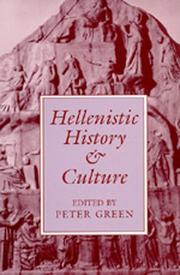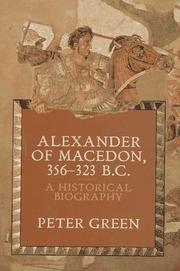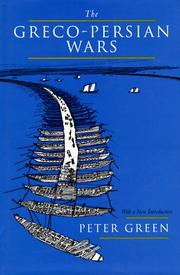| Listing 1 - 10 of 16 | << page >> |
Sort by
|

ISBN: 0520075641 0520203259 052091709X 0585160309 9780520917095 9780585160306 9780520075641 Year: 1993 Volume: 9 Publisher: Berkeley University of California press
Abstract | Keywords | Export | Availability | Bookmark
 Loading...
Loading...Choose an application
- Reference Manager
- EndNote
- RefWorks (Direct export to RefWorks)
In a 1988 conference, American and British scholars unexpectedly discovered that their ideas were converging in ways that formed a new picture of the variegated Hellenistic mosaic. That picture emerges in these essays and eloquently displays the breadth of modern interest in the Hellenistic Age. A distrust of all ideologies has altered old views of ancient political structures, and feminism has also changed earlier assessments. The current emphasis on multiculturalism has consciously deemphasized the Western, Greco-Roman tradition, and Nubians, Bactrians, and other subject peoples of the time are receiving attention in their own right, not just as recipients of Greco-Roman culture. History, like Herakleitos' river, never stands still. These essays share a collective sense of discovery and a sparking of new ideas--they are a welcome beginning to the reexploration of a fascinatingly complex age.
Hellenism --- Hellenism. --- Hellénisme --- Congresses --- Congrès --- Greece --- Regions & Countries - Europe --- History & Archaeology

ISBN: 0520071654 Year: 1991 Publisher: Berkeley : University of California Press,
Abstract | Keywords | Export | Availability | Bookmark
 Loading...
Loading...Choose an application
- Reference Manager
- EndNote
- RefWorks (Direct export to RefWorks)
Generals --- Biography. --- Alexander the Great --- Greece --- History --- Macedonian Expansion, 359-323 B.C. --- Biography --- Kings and rulers

ISBN: 0520203135 0520205731 Year: 1996 Publisher: Berkeley : University of California Press,
Abstract | Keywords | Export | Availability | Bookmark
 Loading...
Loading...Choose an application
- Reference Manager
- EndNote
- RefWorks (Direct export to RefWorks)
Xerxes --- Salamis, Battle of, Greece, 480 B.C --- Salamis, Battle of, 480 B.C. --- Aḥashṿerosh, --- Ahasuerus, --- Assuerus, --- Serse --- Salamis, Battle of, Greece, 480 B.C.
Book
Year: 1959 Publisher: London : Longmans, Green,
Abstract | Keywords | Export | Availability | Bookmark
 Loading...
Loading...Choose an application
- Reference Manager
- EndNote
- RefWorks (Direct export to RefWorks)
Book
Year: 1960 Publisher: London : Longmans, Green & co.,
Abstract | Keywords | Export | Availability | Bookmark
 Loading...
Loading...Choose an application
- Reference Manager
- EndNote
- RefWorks (Direct export to RefWorks)
Book
ISBN: 0273038699 Year: 1992 Publisher: London Pitman
Abstract | Keywords | Export | Availability | Bookmark
 Loading...
Loading...Choose an application
- Reference Manager
- EndNote
- RefWorks (Direct export to RefWorks)
659.4 --- Risk management --- Crisis management --- Corporate image --- Intangible property --- -#SBIB:309H252 --- Incorporeal property --- Intangible assets --- Intangibles --- Property --- Company image --- Corporate identity --- Corporations --- Industrial design coordination --- Crises --- Management of crises --- Management --- Problem solving --- Conflict management --- Insurance --- Public relations (PR) --- Valuation --- Externe communicatie (incl. public relations) --- Law and legislation --- Public relations --- 659.4 Public relations (PR) --- #SBIB:309H252 --- Publicité
Book
Abstract | Keywords | Export | Availability | Bookmark
 Loading...
Loading...Choose an application
- Reference Manager
- EndNote
- RefWorks (Direct export to RefWorks)
Book
Abstract | Keywords | Export | Availability | Bookmark
 Loading...
Loading...Choose an application
- Reference Manager
- EndNote
- RefWorks (Direct export to RefWorks)

ISBN: 0292706049 0292712774 9780292712775 Year: 2006 Publisher: Austin (Tex.) : University of Texas press,
Abstract | Keywords | Export | Availability | Bookmark
 Loading...
Loading...Choose an application
- Reference Manager
- EndNote
- RefWorks (Direct export to RefWorks)
Sicilian historian Diodorus Siculus (ca. 100-30 BCE) is our only surviving source for a continuous narrative of Greek history from Xerxes' invasion to the Wars of the Successors following the death of Alexander the Great. Yet this important historian has been consistently denigrated as a mere copyist who slavishly reproduced the works of earlier historians without understanding what he was writing. By contrast, in this iconoclastic work Peter Green builds a convincing case for Diodorus' merits as a historian. Through a fresh English translation of a key portion of his multi-volume history (the so-called Bibliotheke, or "Library") and a commentary and notes that refute earlier assessments of Diodorus, Green offers a fairer, better balanced estimate of this much-maligned historian. The portion of Diodorus' history translated here covers the period 480-431 BCE, from the Persian invasion of Greece to the outbreak of the Peloponnesian War. This half-century, known as the Pentekontaetia, was the Golden Age of Periclean Athens, a time of unprecedented achievement in drama, architecture, philosophy, historiography, and the visual arts. Green's accompanying notes and commentary revisit longstanding debates about historical inconsistencies in Diodorus' work and offer thought-provoking new interpretations and conclusions. In his masterful introductory essay, Green demolishes the traditional view of Diodorus and argues for a thorough critical reappraisal of this synthesizing historian, who attempted nothing less than a "universal history" that begins with the gods of mythology and continues down to the eve of Julius Caesar's Gallic campaigns.
Book
ISBN: 9782847349245 Year: 2012 Publisher: Paris : Editions Tallandier,
Abstract | Keywords | Export | Availability | Bookmark
 Loading...
Loading...Choose an application
- Reference Manager
- EndNote
- RefWorks (Direct export to RefWorks)
Lutte longue et âpre, les guerres médiques opposèrent pendant cinquante ans les cités grecques à l'empire perse. De la plaine de Marathon (490 av. J.-C.) où les hoplites athéniens mettent les troupes perses en déroute, jusqu'au choc de Platées (479 av. J.-C.) qui marque la fin des hostilités sur le sol grec, Peter Green nous fait revivre la fabuleuse aventure des guerres médiques. De coups de théâtre en retournements dramatiques, il conte le quotidien des soldats et des citoyens, les stratégies militaires et les offensives, et donne l'éclairage indispensable à cet événement historique majeur, sans lequel l'histoire de l'Europe et de l'Asie eut été différente.
| Listing 1 - 10 of 16 | << page >> |
Sort by
|

 Search
Search Feedback
Feedback About UniCat
About UniCat  Help
Help News
News